- Home
- Lemony Snicket
The End asoue-13 Page 15
The End asoue-13 Read online
Page 15
"You don't know what happened to them?" Klaus asked.
Kit shook her head. "All I heard," she said, "was one of the Quagmires calling Violet's name."
Sunny looked into the face of the distraught woman."Quigley," the youngest Baudelaire could not help asking "or Duncan?"
"I don't know," Kit said again. "I'm sorry, Baudelaires. I failed you. You succeeded in your noble errands at the Hotel Denouement, and saved Dewey and the others, but I don't know if we'll ever see the Quagmires and their companions again. I hope you will forgive my failures, and when I see Dewey again I hope he will forgive me, too."
The Baudelaire orphans looked at one another sadly, realizing it was time at last to tell Kit Snicket the whole story, as she had told them. "We'll forgive your failures," Violet said, "if you'll forgive ours."
"We failed you, too," Klaus said. "We had to burn down the Hotel Denouement, and we don't know if anyone escaped to safety."
Sunny gripped Kit's hand in hers. "And Dewey is dead," she said, and everyone burst into tears. There is a kind of crying I hope you have not experienced, and it is not just crying about something terrible that has happened, but a crying for all of the terrible things that have happened, not just to you but to everyone you know and to everyone you don't know and even the people you don't want to know, a crying that cannot be diluted by a brave deed or a kind word, but only by someone holding you as your shoulders shake and your tears run down your face. Sunny held Kit, and Violet held Klaus, and for a minute the four castaways did nothing but weep, letting their tears run down their faces and into the sea, which some have said is nothing but a library of all the tears in history. Kit and the children let their sadness join the sadness of the world, and cried for all of the people who were lost to them. They cried for Dewey Denouement, and for the Quagmire triplets, and for all of their companions and guardians, friends and associates, and for all of the failures they could forgive and all of the treacheries they could endure. They cried for the world, and most of all, of course, the Baudelaire orphans cried for their parents, who they knew, finally, they would never see again. Even though Kit Snicket had not brought news of their parents, her story of the Great Unknown made them see at last that the people who had written all those chapters in A Series of Unfortunate Events were gone forever into the great unknown, and that Violet, Klaus, and Sunny would be orphans forever, too.
"Stop," Kit said finally, through her fading tears. "Stop pushing the raft. I cannot go on."
"We have to go on," Violet said.
"We're almost at the beach," Klaus said.
"The shelf is flooding," Sunny said.
"Let it flood," Kit said. "I can't do it, Baudelaires. I've lost too many people—my parents, my true love, and my brothers."
At the mention of Kit's brothers, Violet thought to reach into her pocket, and she retrieved the ornate ring, emblazoned with the initial R. "Sometimes the things you've lost can be found again in unexpected places," she said, and held the ring up for Kit to see. The distraught woman removed her gloves, and held the ring in her bare and trembling hand.
"This isn't mine," she said. "It belonged to your mother."
"Before it belonged to our mother," Klaus said, "it belonged to you."
"Its history began before we were born," Kit said, "and it should continue after we die. Give it to my child, Baudelaires. Let my child be part of my history, even if the baby is an orphan, and all alone in the world."
"The baby will not be alone," Violet said fiercely. "If you die, Kit, we will raise this child as our own."
"I could not ask for better," Kit said quietly. "Name the baby after one of your parents, Baudelaires. The custom of my family is to name a baby for someone who has died."
"Ours too," Sunny said, remembering something her father had told her when she had inquired about her own name.
"Our families have always been close," Kit said, "even if we had to stay apart from one another. Now, finally, we are all together, as if we are one family."
"Then let us help you," Sunny said, and with a weepy, wheezy nod, Kit Snicket let the Baudelaires push her Vaporetto of Favorite Detritus off the coastal shelf and onto the shores of the island, where eventually everything arrives, just as the outrigger disappeared on the horizon. The children gazed at the islanders for the last time—at least as far as I know—and then at the cube of books, and tried to imagine how the injured, pregnant, and distraught woman could get to a safe place to birth a child.
"Can you lower yourself down?" Violet asked.
Kit shook her head. "It hurts," she said, her voice thick with the poisonous fungus.
"We can carry her," Klaus said, but Kit shook her head again.
"I'm too heavy," she said weakly. "I could fall from your grasp and hurt the baby."
"We can invent a way to get you to the shore," Violet said."Yes," Klaus said. "We'll just run to the arboretum to find what we need."
"No time," Sunny said, and Kit nodded in agreement.
"The baby's coming quickly," she said. "Find someone to help you."
"We're alone," Violet said, but then she and her siblings gazed out at the beach where the raft had arrived, and the Baudelaires saw, crawling out of Ishmael's tent, the one person for whom they had not shed a tear. Sunny slid down to the sand, bringing the stockpot with her, and the three children hurried up the slope to the struggling figure of Count Olaf.
"Hello, orphans," he said, his voice even wheezier and rougher from the spreading poison of the Medusoid Mycelium. Esme's dress had fallen away from his skinny body, and he was crawling on the sand in his regular clothes, with one hand holding a seashell of cordial and the other clutching at his chest. "Are you here to bow before the king of Olaf-Land?"
"We don't have time for your nonsense," Violet said. "We need your help."
Count Olaf's eyebrow raised, and he gave the children an astonished glare. "You need my help?" he asked. "What happened to all those island fools?"
"They abandoned us," Klaus said.
Olaf wheezed horridly, and it took the siblings a moment to realize he was laughing. "How do you like them apples?" he sputtered, using an expression which means "I find this situation quite remarkable."
"We'll give you apples," Sunny said, gesturing to the stockpot, "if you help."
"I don't want fruit," Olaf snarled, and tried to sit up, his hand still clutching his chest. "I want the fortune your parents left behind."
"The fortune isn't here," Violet said. "None of us may ever see a penny of that money."
"Even if it were here," Klaus said, "you might not live to enjoy it."
" McGuffin," Sunny said, which meant "Your scheming means nothing in this place."
Count Olaf raised the seashell to his lips, and the Baudelaires could see that he was trembling. "Then maybe I'll just stay here," he said hoarsely. "I've lost too much to go on—my parents, my true love, my henchfolk, an enormous amount of money I didn't earn, even the boat with my name on it."
The three children looked at one another, remembering their time on that boat and recalling that they had considered throwing him overboard. If Olaf had drowned in the sea, the Medusoid Mycelium might never have threatened the island, although the deadly fungus eventually would have washed up on its shores, and if the villain were dead then there would be no one on the beach who might help Kit Snicket and her child.
Violet knelt on the sand, and grabbed the villain's shoulders with both hands. "We have to go on," she said. "Do one good thing in your life, Olaf."
"I've done lots of good things in my life," he snarled. "I once took in three orphans, and I've been considered for several prestigious theatrical awards."
Klaus knelt down beside his sister, and stared into the villain's shiny eyes. "You're the one who made us orphans in the first place," he said, uttering out loud for the first time a secret all three Baudelaires had kept in their hearts for almost as long as they could remember. Olaf closed his eyes for a moment, grimacing in pain,
and then stared slowly at each of the three children in turn.
"Is that what you think?" he said finally.
"We know it," Sunny said.
"You don't know anything," Count Olaf said. "You three children are the same as when I first laid eyes on you. You think you can triumph in this world with nothing more than a keen mind, a pile of books, and the occasional gourmet meal." He poured one last gulp of cordial into his poisoned mouth before throwing the seashell into the sand. "You're just like your parents," he said, and from the shore the children heard Kit Snicket moan.
"You have to help Kit," Violet said. "The baby is arriving."
"Kit?" Count Olaf asked, and in one swift gesture he grabbed an apple from the stockpot and took a savage bite. He chewed, wincing in pain, and the Baudelaires listened as his wheezing settled and the poisonous fungus was diluted by their parents' invention. He took another bite, and another, and then, with a horrible groan, the villain rose to his feet, and the children saw that his chest was soaked with blood.
"You're hurt," Klaus said.
"I've been hurt before," Count Olaf said, and he staggered down the slope and waded into the waters of the flooded coastal shelf. In one smooth gesture he lifted Kit from the raft and carried her onto the shores of the island. The distraught woman's eyes were closed, and as the Baudelaires hurried down to her they were not sure she was alive until Olaf laid her carefully down on the white sands of the beach, and the children saw her chest heaving with breath. The villain stared at Kit for one long moment, and then he leaned down and did a strange thing. As the Baudelaire orphans looked on, Count Olaf gave Kit Snicket a gentle kiss on her trembling mouth.
"Yuck," said Sunny, as Kit's eyes fluttered open.
"I told you," Count Olaf said weakly. "I told you I'd do that one last time."
"You're a wicked man," Kit said. "Do you think one kind act will make me forgive you for your failings?"
The villain stumbled a few steps away, and then sat down on the sand and uttered a deep sigh. "I haven't apologized," he said, looking first at the pregnant woman and then at the Baudelaires. Kit reached out and touched the man's ankle, right on the tattoo of an eye that had haunted the children since they had first seen it. Violet, Klaus, and Sunny looked at the tattoo, remembering all of the times it had been disguised and all the times it had been revealed, and they thought of all the other places they had seen it, for if you looked carefully, the drawing of an eye also spelled out the initials V.F.D., and as the children had investigated the Volunteer Fire Department, first trying to decode the organization's sinister mysteries and then trying to participate in its noble errands, it seemed that these eyes were watching them, though whether the eyes were noble or treacherous, good or evil, seemed even now to be a mystery. The whole story of these eyes, it seemed, might always be hidden from the children, kept in darkness along with all the other eyes watching all the other orphans every day and every night.
"'The night has a thousand eyes,'" Kit said hoarsely, and lifted her head to face the villain. The Baudelaires could tell by her voice that she was reciting the words of someone else. '"And the day but one; yet the light of the bright world dies with the dying sun. The mind has a thousand eyes, and the heart but one: yet the light of a whole life dies when love is done.'"
Count Olaf gave Kit a faint smile. "You're not the only one who can recite the words of our associates," he said, and then gazed out at the sea. The afternoon was nearly over, and soon the island would be covered in darkness. '"Man hands on misery to man,'" the villain said. "'It deepens like a coastal shelf. Get out as early as you can—'" Here he coughed, a ghastly sound, and his hands clutched his chest. "'And don't have any kids yourself,'" he finished, and uttered a short, sharp laugh. Then the villain's story came to an end. Olaf lay back on the sand, far from the treachery of the world, and the children stood on the beach and stared into his face. His eyes shone brightly, and his mouth opened as if he wanted to tell them something, but the Baudelaire orphans never heard Count Olaf say another word.
Kit gave a cry of pain, thick with poisonous fungus, and clutched her heaving belly, and the Baudelaires hurried to help her. They did not even notice when Count Olaf closed his eyes for the last time, and perhaps this is a good time for you to close your eyes, too, not just to avoid reading the end of the Baudelaires' story, but to imagine the beginning of another. It is likely your own eyes were closed when you were born, so that you left the safe place of your mother's womb—or, if you are a seahorse, your father's yolk sac—and joined the treachery of the world without seeing exactly where you were going. You did not yet know the people who were helping you make your way here, or the people who would shelter you as your life began, when you were even smaller and more delicate and demanding than you are now. It seems strange that you would do such a thing, and leave yourself in the care of strangers for so long, only gradually opening your eyes to see what all the fuss was about, and yet this is the way nearly everyone comes into the world. Perhaps if we saw what was ahead of us, and glimpsed the crimes, follies, and misfortunes that would befall us later on, we would all stay in our mother's wombs, and then there would be nobody in the world but a great number of very fat, very irritated women. In any case, this is how all our stories begin, in darkness with our eyes closed, and all our stories end the same way, too, with all of us uttering some last words—or perhaps someone else's—before slipping back into darkness as our series of unfortunate events comes to an end. And in this way, with the journey taken by Kit Snicket's baby, we reach the end of A Series of Unfortunate Events as well. For some time, Kit Snicket's labor was very difficult, and it seemed to the children that things were moving in an aberrant—the word «aberrant» here means "very, very wrong, and causing much grief" — direction. But finally, into the world came a baby girl, just as, I'm very, very sorry to say, her mother, and my sister, slipped away from the world after a long night of suffering—but also a night of joy, as the birth of a baby is always good news, no matter how much bad news the baby will hear later. The sun rose over the coastal shelf, which would not flood again for another year, and the Baudelaire orphans held the baby on the shore and watched as her eyes opened for the first time. Kit Snicket's daughter squinted at the sunrise, and tried to imagine where in the world she was, and of course as she wondered this she began to cry. The girl, named after the Baudelaires' mother, howled and howled, and as her series of unfortunate events began, this history of the Baudelaire orphans ended.
This is not to say, of course, that the Baudelaire orphans died that day. They were far too busy. Although they were still children, the Baudelaires were parents now, and there was quite a lot to do. Violet designed and built the equipment necessary for raising an infant, using the library of detritus stored in the shade of the apple tree. Klaus searched the enormous bookcase for information on child care, and kept careful track of the baby's progress. Sunny herded and milked the wild sheep, to provide nourishment for the baby, and used the whisk Friday had given her to make soft foods as the baby's teeth came in. And all three Baudelaires planted seeds from the bitter apples all over the island, to chase away any traces of the Medusoid Mycelium—even though they remembered it grew best in small, enclosed spaces—so the deadly fungus had no chance to harm the child and so the island would remain as safe as it was on the day they arrived. These chores took all day, and at night, while the baby was learning to sleep, the Baudelaires would sit together in the two large reading chairs and take turns reading out loud from the book their parents had left behind, and sometimes they would flip to the back of the book, and add a few lines to the history themselves. While reading and writing, the siblings found many answers for which they had been looking, although each answer, of course, only brought forth another mystery, as there were many details of the Baudelaires' lives that seemed like a strange, unreadable shape of some great unknown. But this did not concern them as much as you might think. One cannot spend forever sitting and solving the mysteries of one'
s history, and no matter how much one reads, the whole story can never be told. But it was enough. Reading their parents' words was, under the circumstances, the best for which the Baudelaire orphans could hope.
As the night grew later they would drop off to sleep, just as their parents did, in the chairs in the secret space beneath the roots of the bitter apple tree, in the arboretum on an island far, far from the treachery of the world. Several hours later, of course, the baby would wake up and fill the space with confused and hungry cries. The Baudelaires took turns, and while the other two children slept, one Baudelaire would carry the baby, in a sling Violet had designed, out of the arboretum and up to the top of the brae, where they would sit, infant and parent, and have breakfast while staring at the sea. Sometimes they would visit Kit Snicket's grave, where they would lay a few wildflowers, or the grave of Count Olaf, where they would merely stand silent for a few moments. In many ways, the lives of the Baudelaire orphans that year is not unlike my own, now that I have concluded my investigation. Like Violet, like Klaus, and like Sunny, I visit certain graves, and often spend my mornings standing on a brae, staring out at the same sea. It is not the whole story, of course, but it is enough. Under the circumstances, it is the best for which you can hope.
BRETT HELQUIST was born in Ganado, Arizona, grew up in Orem, Utah, and now lives in Brooklyn, New York. He is hopeful that with the publication of the last book in A Series of Unfortunate Events, he'll be able to step outside more often in the daytime, and sleep better at night.
LEMONY SNICKET is the author of all 170 chapters of A Series of Unfortunate Events. He is almost finished.
To My Kind Editor:
TheendofTHISEND can be found at the end of THE END,
With all due respect,
Lemony Snicket
Book the Last
A Series of Unfortunate Events
CHAPTER FOURTEEN

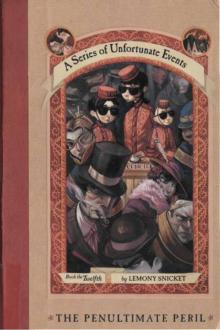 The Penultimate Peril
The Penultimate Peril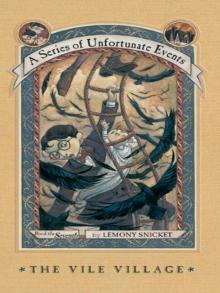 The Vile Village
The Vile Village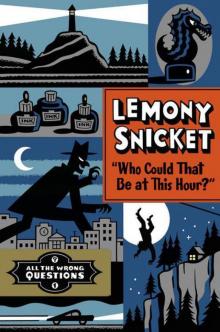 Who Could That Be at This Hour?
Who Could That Be at This Hour? Shouldn't You Be in School?
Shouldn't You Be in School?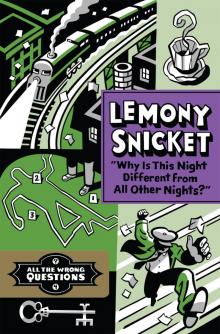 Why Is This Night Different From All Other Nights?
Why Is This Night Different From All Other Nights?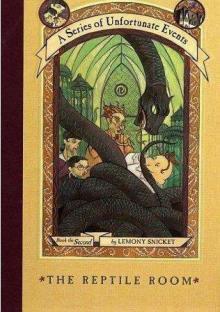 The Reptile Room
The Reptile Room File Under: 13 Suspicious Incidents (1-6)
File Under: 13 Suspicious Incidents (1-6) The End
The End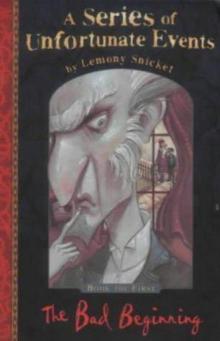 The Bad Beginning
The Bad Beginning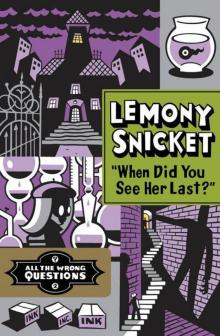 When Did You See Her Last?
When Did You See Her Last?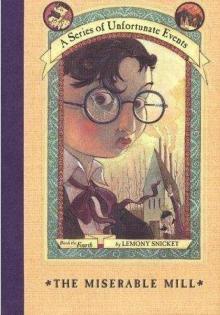 The Miserable Mill
The Miserable Mill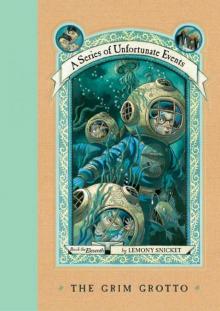 The Grim Grotto
The Grim Grotto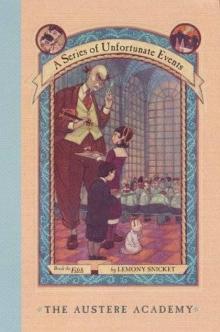 The Austere Academy
The Austere Academy The Ersatz Elevator
The Ersatz Elevator The Wide Window
The Wide Window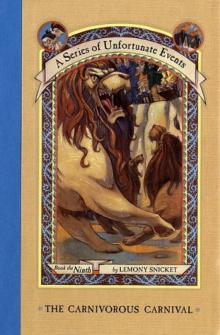 The Carnivorous Carnival
The Carnivorous Carnival A Series of Unfortunate Events Box: The Complete Wreck
A Series of Unfortunate Events Box: The Complete Wreck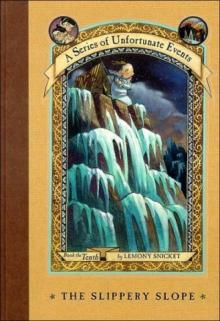 The Slippery Slope
The Slippery Slope Read Something Else
Read Something Else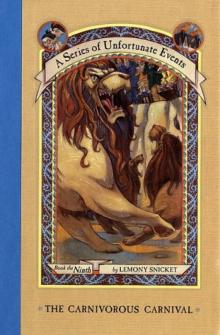 The Carnivorous Carnival asoue-9
The Carnivorous Carnival asoue-9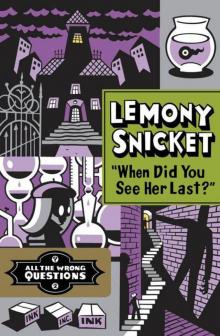 When Did You See Her Last
When Did You See Her Last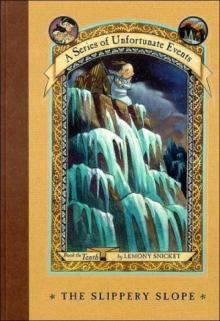 The Slippery Slope asoue-10
The Slippery Slope asoue-10 The Hostile Hospital asoue-8
The Hostile Hospital asoue-8 A Series of Unfortunate Events Collection: Books 1-13 with Bonus Material
A Series of Unfortunate Events Collection: Books 1-13 with Bonus Material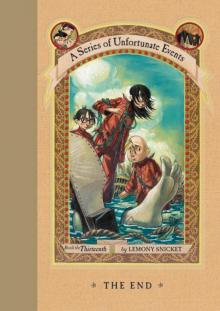 The End asoue-13
The End asoue-13 File Under
File Under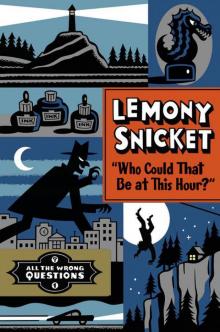 Who Could That Be at This Hour? (All the Wrong Questions)
Who Could That Be at This Hour? (All the Wrong Questions)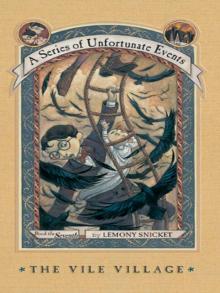 The Vile Village asoue-7
The Vile Village asoue-7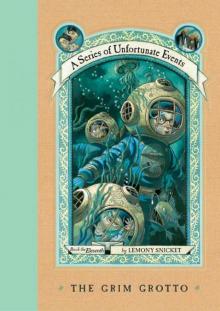 The Grim Grotto asoue-11
The Grim Grotto asoue-11